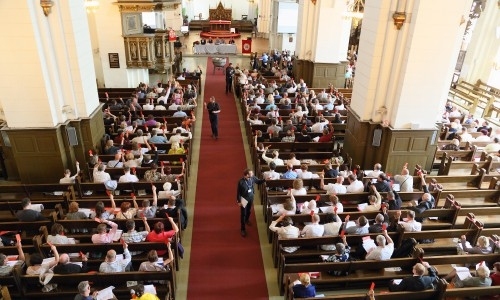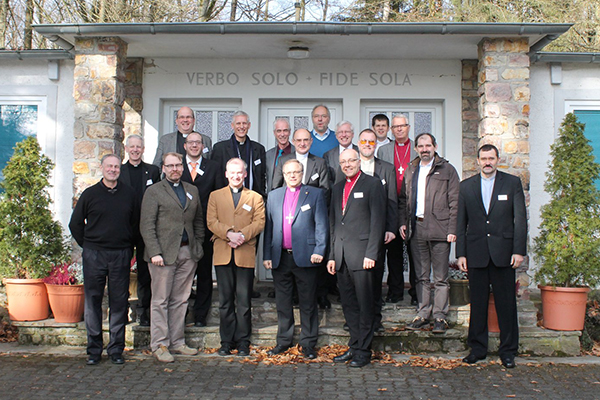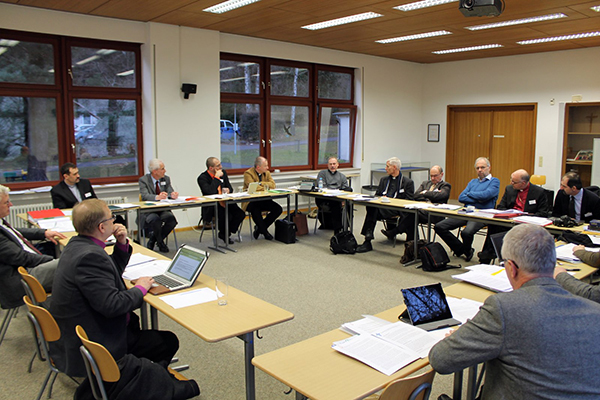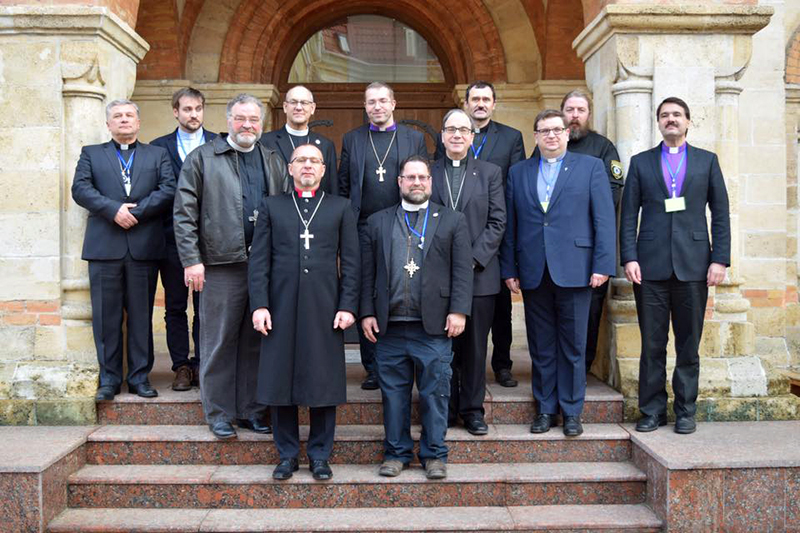
Caption: Back: Bishop Alexander Yurchenko (SELCU), Vice President Oleg Schewtschenko (SELCU), Rev. Daniel S. Johnson (LCMS-SELC), Bishop Mindaugas Sabutis (LELB), Rev. Olav Panchu (ELCIR), Valera Partizan (DELKU). Front: President Matthew C. Harrison (LCMS), Bishop Serge Maschewski (DELKU), Rev. Dr. Albert Collver (LCMS), President Robert Bugbee (LCC), Rev. Andris Kraulin (ELCL), Bishop Vsevolod Lytkin (SELC).
UKRAINE – The heads of several Lutheran churches in the former Soviet Union recently met together in Ukraine for the Eastern European Bishops Conference, along with the heads of their North American partner churches.
The conference, held in Odessa in late February, was hosted by the German Evangelical Lutheran Church of Ukraine (DELKU) and its Bishop Sergey Maschewski. DELKU, long associated with the state (territorial) Lutheran churches of Germany, has in recent years begun aligning itself with more conservative bodies like The Lutheran Church—Missouri Synod (LCMS) and Lutheran Church–Canada (LCC). In addition to the presidents of LCC and LCMS, DELKU also hosted the bishops (or their representatives) from several other Lutheran church bodies in eastern Europe, including the Evangelical Lutheran Church of Ingria in Russia (ELCIR), the Evangelical Lutheran Church of Latvia (LELB), and the Evangelical Lutheran Church in Lithuania (ELCL), the Synod of Evangelical Lutheran Churches in Ukraine (SELCU), and the Siberian Evangelical Lutheran Church (SELC). The conference also welcomed a number of ecumenical guests.
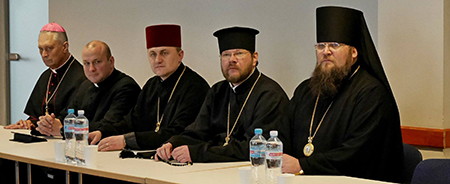
Ecumenical guests at the Eastern European Lutheran Bishops Conference. (Photo: Facebook page of the Evangelical Lutheran Cathedral of the Apostle Paul).
During the conference, the bishops reported on their respective churches and the challenges they face. A number of these churches have to do their work over long distances: SELC, for example, is stretched out over a vast territory spanning 7,000 kilometers. DELKU, as another example, struggles with a severe clergy shortage, currently operating 28 congregations with only nine pastors. Many of these congregations are distant from the nearest neighbouring pastor or parish.
The bishops also discussed opportunities for future cooperation between their churches. “United by much of our common history and—what is of more relevance today—by similar theological outlook, we felt that there was a need for closer cooperation in the future,” explained Rev. Alexey Strelstov, rector of the Siberian Evangelical Lutheran Church’s seminary in Novosibirsk, Russia. Rev. Strelstov presented on education in a confessional Lutheran context on the final day of the conference.
Part of that future cooperation may well take place on theological education. One evening of the conference, the Synod of Evangelical Lutheran Churches in Ukraine invited participants to visit their seminary in Usatovo, a suburb of Odessa. Representatives of the Siberian church expressed interest in forging closer ties with SELCU on seminary education. There were discussions on assisting the Ukrainian seminary in procuring more Russian-language theological books for its library, as well as the possibility of SELC seminary professors coming to teach short-term courses in Usatovo. “The interaction between these Russian speakers, all keenly interested in the faithful biblical training of pastors, was a real joy to watch,” noted LCC President Robert Bugbee. LCC has long-supported SELCU’s seminary education program.
Morning and afternoon devotions at the bishops’ conference were held in DELKU’s Evangelical Lutheran Cathedral of the Apostle Paul in downtown Odessa, restored in recent years after having been destroyed by the Soviet regime decades ago. “Although this church was rebuilt on a somewhat smaller scale, it once seated 1,200 worshippers and was the centre for spiritual life of the entire German community before the communist repression,” noted LCC President Bugbee. Lutheran churches were severely persecuted during the soviet era.
The Evangelical Lutheran Church of Ingria in Russia and the Siberian Evangelical Lutheran Church are both members of the International Lutheran Council, as are Lutheran Church–Canada and The Lutheran Church—Missouri Synod. The Synod of Evangelical Lutheran Churches in Ukraine is a partner church of LCC, while the Evangelical Lutheran Church of Latvia and the Evangelical Lutheran Church in Lithuania are partner churches of the LCMS. The German Evangelical Lutheran Church of Ukraine, meanwhile, has been seeking closer relations to the LCMS in recent years.
———————

